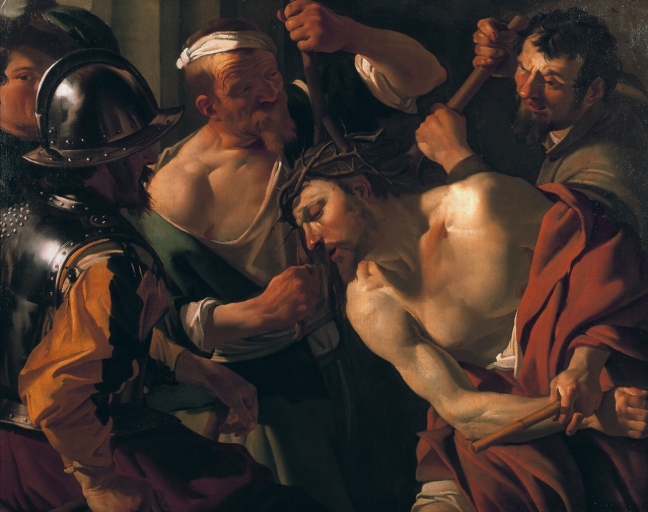JESUS AS SON: PART 4 “ENTER THE DIVINE KING”
“The beginning of the Gospel…”
-Mark 1:1

The understanding that I am about to discuss briefly below is a debated one. Although I hold on to the classical belief of Jesus’ deity, I have my reasons. Truly, it is my sincere desire that this post will help show why classical Christianity has taken up this belief; the belief in Jesus as God. May those of you seeking truth find it…
The Gospels. There isn’t much one can say about them as they are already widely known as the accounts chronicling the life, and teachings of Jesus. Apart from serving this crucial role, the problem then arises of why 4 accounts? [Notice how tackling this particular issue is essentially a textual problem]. The accounts, as theologians have come to see, provide a specific insight into how the divinity of Jesus was necessary and sufficient to carry out the roles of Servant [Mark], Son of Man (a human being) [Luke], King [Matthew] and Divine Authority [John]. In other words, the divine nature of Jesus is the cream of the cake as far as the texts are concerned as it serves as the over-ruling ingredient in his presentation in the Gospel accounts.
Jesus introduction in the accounts as being ‘a gospel’ immediately notified the early/first readers of the Gospel accounts to the fact that it was making a radical statement. You see, at the time, rulers of Rome, specifically Caesar referred to the reports of their enthronement as embodied deities as gospels/good news. But you see, the Gospels take it a little bit further for Jesus; they claim that Jesus’ birth is good news as seen in the events surrounding his birth. Jesus’ incarnation as man through birth was big and hence, unlike Caesar, he also has the title of Immanuel/Emmanuel ‘God with us’ (as seen in Luke’s account).
Apart from Caesar being known as the ‘Embodied God’, he also went by another title, “Son of God”. Now, in the Roman sense, Caesar was attributing his authority as an earthly ruler to the fact that he (according to Roman belief) was descended from the gods. Now, Jesus, on the other hand is an equally peculiar figure. He went on stating that his kingdom was ‘not of this world’ and that his ‘father was God’ making himself equal with God. I hope that at this point some of you have begun to see the trend and relationship between godhood/deity and kingship because in the ancient world those two things played an enormous role together. Their roles were almost inseparable.
This tie in with the Jewish belief of the day shed light to Jesus’ work and to why communicating him to the Jews as well as the Gentiles [as seen in the Gospels] was made relatively easy. Actually it is in this same light that the Sanhedrin questioned Jesus, asking him if he was ‘the Son of the Blessed’ (i.e. God). Jesus’s answer? “Yes”. What else followed after his reply? “And you shall see the Son of Man sitting at the right hand of the Father in heaven coming in the clouds with great power and glory”. What did those who heard it do? They rent their clothes shouting ‘BLASPHEMY!’.
So, the people back then knew that what Jesus was talking about was a big deal indeed. Caesar who had also crowned himself kurie et dieu ‘Lord and God’ did not know that Jesus went by these very titles in his day and age. As peculiar as this information must be, it must also be understood that as of this particular point in time the Jewish rabbinic teachings from the Babylonian Exilic Period did include something of a “Two-Throne in Heaven” theory. This theory stated that according to the prophets such as Daniel, the Messiah is shown to have a throne by Yahweh’s side. This problem perplexed the rabbis for centuries as it raised questions about the identity of the Messiah as being more than a human being reigning with God.
Some scholars turned to such texts as Psalm 45 that spoke about the Messiah as ‘God’; other texts such as Isaiah 48:16 that spoke about ‘the Lord God and his Spirit have sent me’; other texts like ‘the Lord said to my Lord, sit at my right hand’ (Psalm 110:1, Matthew 22:44) were used by Jesus to hint at his divinity. What’s most shocking though is that the Bible goes on to say that once Jesus put out that argument to the religious scholars of the day, ‘no one even dared question him again’.
But what makes things very strange about Jesus is his claim to be the “I AM” of Exodus 6 as witnessed in the Gospels (mainly John) as well as the rest of the New Testament. It is clear that Jesus ‘lowered himself and took the form of a servant’ according to Philippians 2, but that was not all. The text continues to say, ‘he humbled himself even to the point of death, even death on the cross’ and ‘therefore God has exalted him giving him him the name that is above every other name, that at the name of Jesus every knee should bow and every tongue confess that Jesus Christ is Lord…’. The text in Philippians supports Jesus’s claim to be I Am of the Old Testament when the text applied to God is applied to Jesus in the book (i.e. Isaiah 45: 23-24). God as Yahweh God, the covenant name for the Israelite God made this claim; and Jesus is revealed to be he thus making his equality with God all the more interesting (especially if seen through how it is portrayed in Philippians chapter 2).
Stranger still, Jesus is revealed not to be the spoken word of creation at Genesis but the Speaker of the word by the Father himself in Hebrews 1. Jesus is established to be creator who ‘by the might of the word of his power not only created but sustains all things’. It is he as Caesar was to the Romans who has absolute authority as the pantokratos (i.e. supreme ruler) to judge his citizens; but Christ’s is a wider scope, i.e. everyone ever created (John 1) ‘he came to the world-to his own, but his own did not receive him’. Evidence for this is seen in Jesus’s claim in John that, “the Father judges no one, but has committed all judgement to the Son.
Finally, his revelation to John echoes the points stated above. His vision of Christ is the amalgamation of all his roles. He is seen possessing the head and hair that is reminiscent of Daniel’s vision of the Ancient of Days (i.e. God); his gold sash and long robe reminiscent of the garments of the high priest (note the lack of the urim and thummim as well as the ephod—indicatve end of the previous error of priesthood that was still a picture of the veiled mysteries to come but in Christ have now been made manifest; and the single sash of gold as representative of one people and not tribal as we saw in the old testament); his flaming eyes as Judge of All the Earth (reminiscent of Abraham’s conversation with Yahweh before Sodom and Gomorrah’s destruction); his voice like the sound of rushing waters (indicative/reminiscent of his authority and identity as God–ref the prophets for more e.g. Isaiah, Ezekiel…); the sharp double edge sword proceeding from his mouth (reminiscent of Hebrews’ reference of Christ upholding all things by the power of his sheer utterance–another fun bite is the fact that it alludes to Jesus’s divine authorship of the Scriptures as a whole-as his book! as seen at the end of Revelation in chapter 22:6,16); his face shining in all his brilliance is indicative of his holiness as well as his divinity in his mortality/human form (is also a reference to 1 Corinthians 11:3 ,Ephesians 5:23 and 2 Corinthians 4:1-6).
All hail the King “eternal, immortal, invisible, the only true God…”
Maranatha Come quickly, Lord Jesus!


